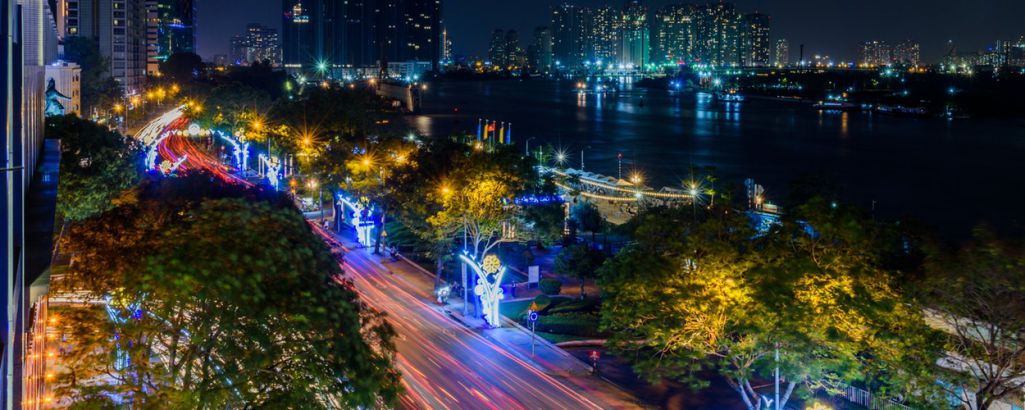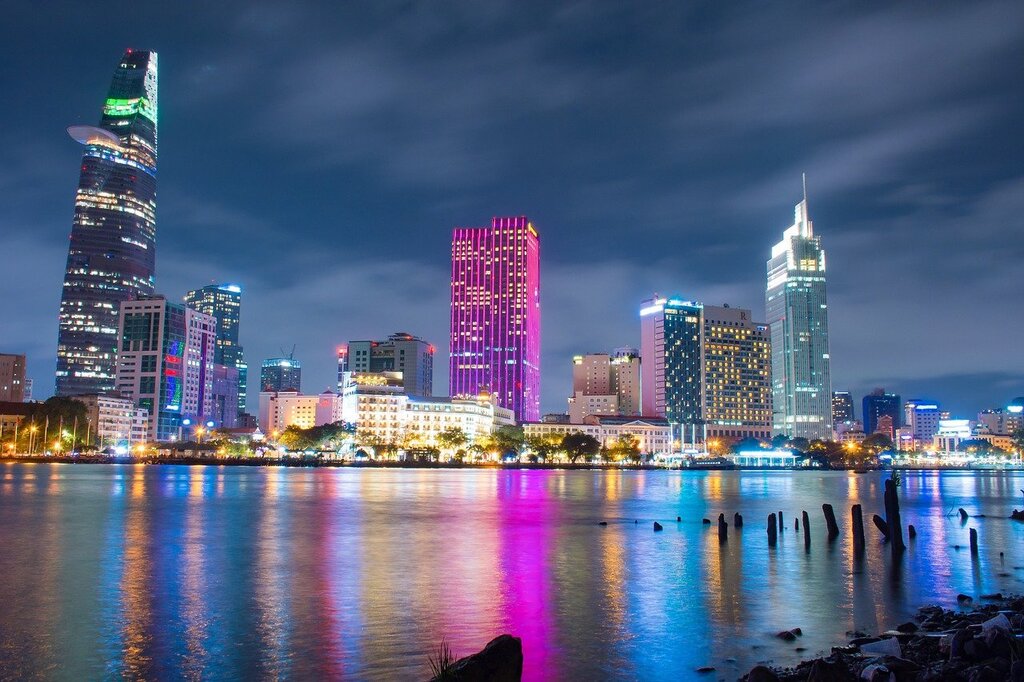The concept of smart cities has become one of the most talked-about topics in recent years. Artificial intelligence and information technology will be utilised to manage and improve living standards, improve the quality of local government services, and use energy and natural resources more efficiently. For Vietnam, adopting and implementing smart cities initiatives could be a game-changer for its highly populous cities.
—
Ho Chi Minh City (HCMC), which has a population of more than 10 million people, was one of the first cities to pass a resolution on a project to transform the city into a smart city between 2017 and 2020, with a goal to be fully transformed by 2025.
“HCMC will build a reasonably high and sustainable economy, based on best resource utilisation, with people as the city’s centre,” according to the project’s representative. It plans to build a smart city with four centres: a Smart City Operation Centre, a Shared Data Warehouse, and the establishment of an open data ecosystem, a Centre for Socio-Economic Simulation and Forecast, and a Centre for Information Security. Since January 2019, the Smart City Operation Centre (phase 1) has been in trial operation.
What Makes a City ‘’Smart’’?
A sustainable smart city, according to the International Telecommunication Union (ITU), is “an innovative city that uses information and communication technology (ICT) and other means to improve quality of life, the efficiency of urban operations and services, and competitiveness, while ensuring that the economic, social, environmental, and cultural needs of present and future generations are met.”
According to the European Commission, smart cities are divided into six categories:
- E-government contains solutions for increasing administrative unit efficiency and optimising functions.
- Investment solutions, such as efficient production and a flexible labour market, are part of the smart economy.
- Smart transportation comprises green and clean solutions that save money and reduce emissions, while a smart environment includes clean energy, smart buildings, and low energy usage.
- Solutions for clean energy, renewable energy, network management, pollution monitoring, waste monitoring, water supply and drainage, intelligent works, and buildings are all part of the smart environment; a low-energy-consumption design.
- Educated citizens in the direction of an open information society.
- Smart living solutions assist people in improving their quality of life in terms of consumption, lifestyle, security, and health.
The Process of Smart City Development in Vietnam
We are living in a time when two major trends in human history are colliding: rising global urbanisation and the digital revolution. According to a United Nations, cities today house 54.6% of the world’s population, or about 3.6 billion people; but research indicates that by 2050, it will account for more than 70% of the world’s population (64.1% in developing countries and 85.9% in developed countries will live in urban areas).
Housing, energy, security, health, and education requirements, as well as issues such as media and entertainment, have presented cities and countries with a number of challenges in meeting the growing needs of the population, beginning with basic items such as infrastructure, environment, traffic, and disaster response; housing, energy, security, health, and education requirements, as well as media and entertainment. As a result, city planning, management, and operation, not to mention guaranteeing sustainable economic, social, and environmental growth, will be a challenge that almost all countries, including Vietnam, will have to face and find solutions in this century.
Mr. Phan Thanh Son, Director of FPT Corporation’s Strategic Business Department, stated that Vietnam has roughly 800 urban regions, with the first wave of smart cities occurring in 2017 – 2020, the second wave occurring in 2021 – 2025, and the third wave occurring after 2025. The second wave began to emerge in 2005, and the third wave began to develop in 2010 and continues to this day. More than 40 cities, large and small, have smart cities initiatives and programmes as a result of these waves.

In Vietnam, there are now 10 provinces and cities that have designed and authorised smart city initiatives. The projects, on the other hand, are only focused on stimulating the growth of information technology infrastructure, rather than on technology infrastructure investment. Some examples of typical projects include Da Nang being named the first of 33 smart cities in the world by IBM Technology Group in 2012. The smart city programme then awarded Da Nang more than $50 million in funding. This programme focuses on ensuring water quality for people, providing the greatest public transportation, and reducing traffic congestion through the deployment of a smart central management solution.
Ho Chi Minh City and Hanoi have also taken special initiatives to adopt various components of smart cities, including experimenting with selling bus tickets via cards rather than traditional paper tickets. In other regions, the deployment of wifi cities, plans for using mobile phones to convey traffic information, or ideas for digitising activities in the daily lives of some enterprises are all being considered.
“At the municipal level, many local governments have been making specific efforts in constructing smart cities such as enhancing the efficiency of power use, water, and social services,” said Matthew Powell, Director of Savills Hanoi. Investors and purchasers alike are striving to intelligently manage and control operations at the project and building level, from security systems to internet access, from electricity usage to other aspects such as elements to lessen the impact on the environment. At the apartment level, items that are integrated with intelligent support systems and simultaneously connected to the internet provided by third parties have steadily arrived on the market.”
You might also like: Top 7 Smart Cities in the World
The Future Of Smart City in Vietnam
The creation of a smart city is a vital need in the era of the rising Industrial Revolution 4.0. Smart cities have enormous benefits to people’s lives and the economy. In fact, the Vietnamese government has made significant efforts to foster this process.For example, the Prime Minister issued a governmental policy in 2018 to implement the Sustainable Smart City Development Project for the period 2018 – 2025 and to be completed by 2030. In October 2019, the project began on a 272-hectare site in Da Nang and was known as one of the earliest smart city projects in Vietnam. This smart city is being designed to be environmentally friendly, with management systems that include high-tech applications in the domains of energy, health, and education.
Vingroup, Vietnam’s largest private corporation, is likewise paying attention to this trend. Vinhomes Smart City is a smart city being developed by Vingroup. Vinhomes Smart City, with a land area of 280 hectares, has learned from smart city models across the world: Singapore, Songdo in South Korea, and Fujisawa in Japan. Vietnam is a country filled with vast opportunities for smart city development. As a result, the development of smart cities geared towards the sharing economy in major cities such as Ho Chi Minh City, Hanoi, Da Nang, Nha Trang, and potentially many more following suit in the near future.
Smart cities have numerous advantages for the community, the environment, and society. In Vietnam, some provinces and cities have already developed and approved smart urban projects, with solar power being encouraged to develop to supplement existing electricity sources. The installation of rooftop solar power in households, businesses, and commercial buildings, is facilitated to provide on-site energy. This is one of the important strategies and premises for provinces to successfully build smart cities.
Featured image by: Pixabay


















